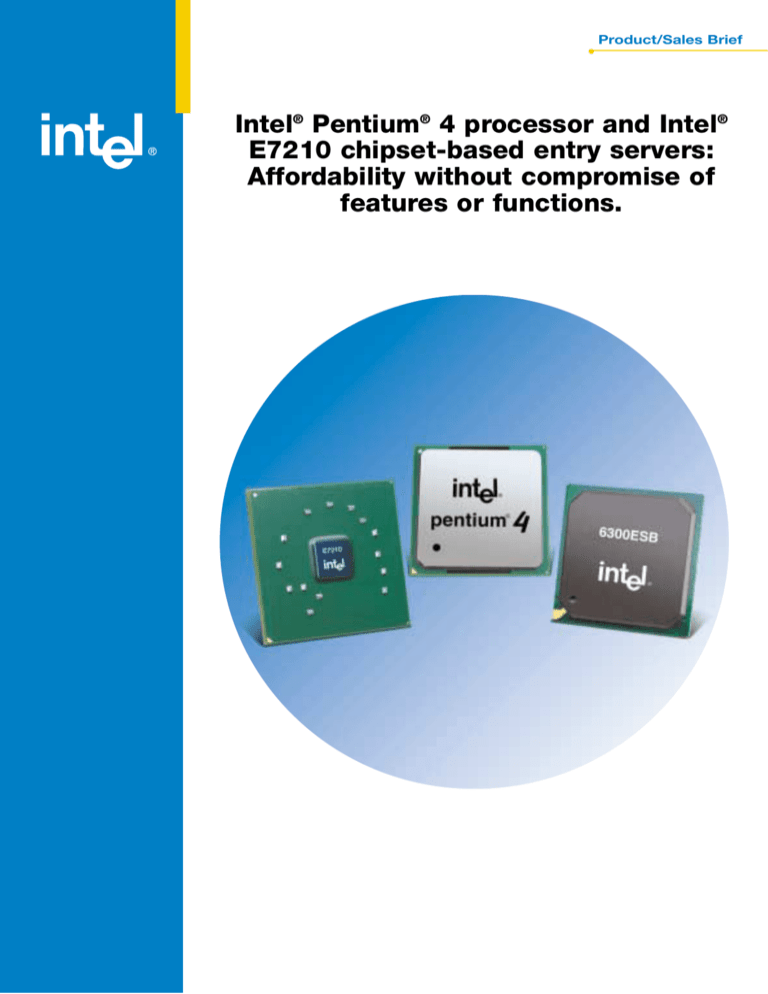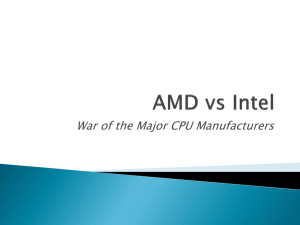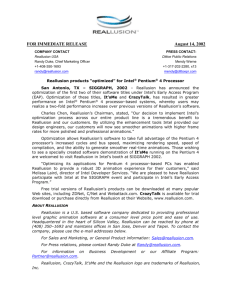
Product/Sales Brief
Intel® Pentium® 4 processor and Intel®
E7210 chipset-based entry servers:
Affordability without compromise of
features or functions.
The Intel® E7210 Chipset for Affordable yet
Reliable, Entry-level Server Platforms
tion which allows the processor to execute instruction
threads in parallel so the processor can complete more
tasks in the same amount of time. This maximizes the
efficiency of the processor, improving system performance
and responsiveness (HT Technology is also available on
dual processor servers with the Intel Xeon processor and
Intel E7501 chipset).
For small and medium businesses, server downtime
means business downtime, and business downtime translates into lost productivity and revenue. Business users
require servers that are powerful enough to handle their
computing workloads, and at the same time provide
reliable and trouble-free operation. Intel offers two server
platforms specifically targeted for the small and medium
business market segments. The first is a mainstream
volume and performance server powered by dual Intel®
Xeon™ processors and the Intel® E7501 chipset. The
second is an entry-level server based on the Intel®
Pentium® 4 processor supporting HT (Hyper-Threading)
Technology1 with the Intel® E7210 chipset. For budgetconscious business users, an entry-level server delivers
impressive computing performance without compromising
system reliability, and represents a significant step up from
“servers” based on desktop PCs.
Leading-edge Chipset Innovations
The Intel E7210 chipset, with dual channel DDR-400
memory support, provides an aggregate memory
bandwidth of 6.4 gigabytes per second (GB/s). This
enables a balanced platform design and delivers
maximum system performance for memory intensive
server applications. The performance of a 3.20E GHz Intel
Pentium 4 processor supporting HT Technology and the
Intel E7210 chipset based server, as measured using the
NetBench* benchmark, is 80% higher compared to a
previous generation Intel Pentium 4 processor 2.40 GHz
and Intel® 845E chipset-based system.
Introducing Intel’s first chipset optimized for the
entry server segment
The highly integrated Intel E7210 chipset, consisting of
the Intel E7210 memory controller hub and the Intel®
6300ESB I/O controller hub, is designed to operate with
the latest Intel Pentium 4 processor supporting HT
Technology and 800 MHz system bus, with the Intel
E7210 chipset providing the intelligence to manage and
prioritize the workloads. HT Technology is an Intel innova-
The Intel E7210 chipset-based platform provides a
dedicated Ethernet networking bus interface based on
Intel’s Communication Streaming Architecture (CSA). With
the Intel® 82547EI gigabit Ethernet controller, CSA
provides dedicated I/O bandwidth to achieve near-wirespeed gigabit Ethernet performance.
Intel® Pentium® 4 processor/Intel® E7210 chipset-based entry server
Server Performance
NetBench* Enterprise Disk Mix
1.8
2.0
1.6
1.5
1.0
1.0
0.5
0.0
Intel® Pentium® processor
2.40 GHz/Intel® 845E chipset
Intel® Pentium® 4 processor
3.20 GHz supporting
HT Technology/Intel® E7210 chipset
Intel® Pentium® 4
3.20E GHz supporting
HT Technology/Intel® E7210 chipset
System configurations:
Source: Veritest* Labs (Dec ‘03)
Intel® Pentium® 4 processor 2.40 GHz with 512kB L2 cache, Intel® 845E chipset based (Intel S845WD1) board with 533 MHz system bus; 1GB single channel DDR-266
memory; Microsoft* Windows* 2003 Server; Intel® PRO/1000 Gigabit Server adapter; Western Digital WD153BA 15.3GB 7200 rpm IDE (primary master), Maxtor 91024U3
10GB 7200 rpm IDE (primary slave), Maxtor 5T030H3 30GB 7200 rpm IDE (secondary master), Seagate ST340016A 40GB 7200 rpm IDE (secondary slave); NetBench
Enterprise disk mix
Intel® Pentium® 4 processor supporting HT technology 3.20 GHz with 512kB L2 cache, Intel® E7210 chipset based Intel reference server board with 800 MHz system bus;
1GB dual channel DDR-400 memory; Microsoft* Windows* 2003 Server; Intel® PRO/1000 Gigabit Server adapter; Western Digital WD153BA 15.3GB 7200 rpm IDE
(primary master), Maxtor 91024U3 10GB 7200 rpm IDE (primary slave), Maxtor 5T030H3 30GB 7200 rpm IDE (secondary master), Seagate ST340016A 40GB 7200 rpm
IDE (secondary slave); NetBench Enterprise disk mix
Intel® Pentium® 4 processor supporting HT technology 3.20E GHz with 1MB L2 cache, Intel® E7210 chipset based Intel reference server board with 800 MHz system bus;
1GB dual channel DDR-400 memory; Microsoft* Windows* 2003 Server; Intel® PRO/1000 Gigabit Server adapter; Western Digital WD153BA 15.3GB 7200 rpm IDE
(primary master), Maxtor 91024U3 10GB 7200 rpm IDE (primary slave), Maxtor 5T030H3 30GB 7200 rpm IDE (secondary master), Seagate ST340016A 40GB 7200 rpm
IDE (secondary slave); NetBench Enterprise disk mix
NetBench is a portable benchmark program that measures how well a file server handles file I/O requests from 32-bit Windows clients. NetBench reports throughput and
client response time measurements.
1 Hyper-Threading Technology requires a computer system with an Intel® Pentium® 4 processor supporting HT Technology, a chipset and BIOS that utilize this technology, and
an operating system that includes optimizations for this technology. Look for systems with the Intel® Pentium® 4 Processor with HT Technology logo which your system
vendor has verified utilize Hyper-Threading Technology. Performance will vary depending on the specific hardware and software you use. See www.intel.com/info/hyperthreading for information.
Intel® Pentium® 4 Processor
6.4 GB/s
3.2 GB/s
Communication Streaming
Architecture/GbE
266 MB/s
E7210
Intel® Hub
Dual Independent
Serial ATA Ports
DDR-400
Intel®
3.2 GB/s
DDR
Architecture
150 MB/s
533 MT/s
Intel®
6300ESB
PCI-X
133 MT/s
PCI
Legacy ATA 100
BIOS Supports
HT Technology
To support demanding disk I/O, the Intel E7210 chipset
integrates two Serial ATA controllers with optional RAID 0
and 1 capability. RAID 0 striping increases storage performance and is designed to speed up data transfer rates for
disk-intensive applications. RAID 1 mirroring protects
valuable data that might be lost in the event of a hard
drive failure.
Fast I/O performance is critical for servers. PCI throughput
is often the obstacle to faster I/O performance. Unlike
chipsets designed for the desktop market segment, the
integrated PCI-X bridge in the Intel 6300ESB component
allows higher I/O performance by supporting new PCI-X
server cards that conform to the PCI-X 1.0 specification.
Four integrated Hi-Speed USB 2.0 ports provide high
bandwidth connectivity across a variety of peripherals.
Reliability and Manageability
A server needs to provide reliable operation and ensure
data security. The Intel E7210 chipset incorporates
enhanced system reliability features. In addition to error
correction on the memory interface (ECC), the E7210
chipset also supports single memory channel operation,
for a more cost effective system. Single channel operation
is extremely useful in the event a single channel memory
fails, allowing the system to continue to operate.
The Intel 6300ESB I/O controller hub enhances server
manageability by integrating a programmable watchdog
timer (WDT). The WDT increases system availability by
monitoring the server for hardware and/or software lockups. Upon a lock-up, the WDT can either notify the
operating system or perform a system reboot. The WDT
Hi-Speed USB 2.0
4 Ports
can be accessed by operating system services or applications directly.
In addition to the built-in reliability features, the E7210
chipset is backed by more than 20 years of chipset
experience, significant investment in research and development, and thousands of man-hours committed to
chipset and software validation. As a result, an entry-level
server based on the Intel Pentium 4 processor supporting
HT technology and the Intel E7210 chipset delivers key
features for value-conscious organizations running nonmission critical workloads and applications such as file
and print sharing, web serving, firewalls, load-sharing and
light weight application servers while meeting the rigorous
quality and reliability standards enterprise users have
come to expect.
The Intel E7210 chipset consists of two components:
The E7210 Memory Controller Hub (MCH): supports
800MHz and 533MHz system bus designs using DDR400
or DDR333 SDRAM memory respectively.
The 6300ESB I/O Controller Hub: integrates dual
independent Serial ATA controllers, each capable of up to
150 MB/s transfer rate, for the most demanding storage
data transfers. Four Hi-Speed USB 2.0 ports allow easy
I/O connection, while offering improved bandwidth
compared to USB 1.1 devices. The integrated PCI-X
bridge supports up to four PCI-X devices total, and represents a significant increase in bandwidth compared to
desktop systems.
Feature
Benefit
Intel Pentium 4 processor supporting HT Technology
Supports advanced CPU features and the fastest frequencies
®
®
HT Technology extends system performance beyond GHz operation to
increase system responsiveness
800 MHz front side bus
Coupled with faster processor speeds, it offers enhanced computing
power to meet the requirements in entry server environments
Dual Channel DDR400 w/ ECC support memory bus
Provides optimal and balanced performance through matched
processor and memory bus bandwidth
ECC ensures data reliability and integrity
Continues to operate in single channel mode in the event of a single
memory channel failure
Integrated PCI-X bridge
Integrated bridge addresses the need for increased I/O bandwidth of
PCI devices while reducing server bottlenecks
An additional integrated PCI 2.2 compliant bus provides conventional
and legacy PCI device connectivity
Communication Streaming Architecture Port (CSA)
With the Intel® 82547EI gigabit Ethernet component, CSA provides
dedicated I/O bandwidth to achieve near-wire-speed GbE for higher
performance Ethernet
CSA offloads the I/O controller hub from LAN traffic to give PCI and
storage devices more bandwidth
Integrated SATA controller with optional software2 RAID 0,1 capability
Integrated software RAID capable controller provides faster disk
bandwidths, performance and reliability while reducing bill of material
costs with add-in devices on the motherboard
Integrated programmable watchdog timer
To maximize system availability, the server can be automatically
restarted (or shut down) if the operating system, drivers, or services
cease to function or lock-up
Four integrated Hi-Speed USB 2.0 ports
High bandwidth connectivity across a variety of peripherals via the
integrated USB 2.0 ports
USB 2.0 offers up to 40x bandwidth over the original USB 1.1
specification
2 Provided by 3rd party vendor. For additional information,
please contact your Intel field sales representative.
For more information, visit the Intel Web site at: developer.intel.com
Product Package
Intel® Pentium® 4 Processor
Intel® E7210 MCH
Intel® 6300ESB
Intel® 82547EI Gigabit Controller
Intel Access
Intel® Pentium® 4 Processor
Intel® Chipsets Home Page
Intel® Server Products
Intel® Reseller Center
Other Intel Support
Intel Literature Center
General Information Hotline
UNITED STATES AND CANADA
Intel Corporation
Robert Noyce Bldg.
2200 Mission College Blvd.
P.O. Box 58119
Santa Clara, CA 95052-8119
USA
EUROPE
Intel Corporation (UK) Ltd.
Pipers Way
Swindon
Wiltshire SN3 1RJ
UK
478-pin Flip Chip-Pin Grid Array (FC-PGA)
1005 ball Flip Chip-Ball Grid Array (FC-BGA)
689 ball Plastic Ball Grid Array (PBGA)
196-pin Plastic Ball Grid Array (PBGA)
http://developer.intel.com/design/pentium4
http://developer.intel.com/design/chipsets
http://developer.intel.com/design/servers/buildingblocks
http://program.intel.com
http://support.intel.com
(800) 548-4725 7 a.m. to 7 p.m. CST (U.S. and Canada)
International locations please contact your local sales office.
(800) 628-8686 or (916) 356-3104 5 a.m. to 5 p.m. PST
ASIA-PACIFIC
Intel Semiconductor Ltd.
32/F Two Pacific Place
88 Queensway, Central
Hong Kong
SOUTH AMERICA
Intel Semicondutores do Brasil Ltda
Av. Dr. Chucri Zaidan, 940-10∞ andar
04583-904 São Paulo, SP
Brazil
JAPAN
Intel Japan (Tsukuba HQ)
5-6
Tokodai Tsukuba-shi
300-2635 Ibaraki-ken
Japan
The Intel® Pentium® 4 processor, the Intel® E7210 chipset and the Intel® 82547E1 gigabit Ethernet controller may contain
design defects or errors known as errata which may cause the product to deviate from published specifications. Current
characterized errata are available on request. Intel Corporation assumes no responsibility for the use of any circuitry other
than circuitry embodied in an Intel® product. Information contained herein supersedes previously published specifications
on these devices from Intel. Intel, the Intel logo and Pentium are trademarks or registered trademarks of Intel Corporation
or its subsidiaries in the United States and other countries.
*Other names and brands may be claimed as the property of others.
Copyright © 2004 Intel Corporation. All rights reserved. 1203/PDF/BC/SAJ
Order Number: 300800-001








